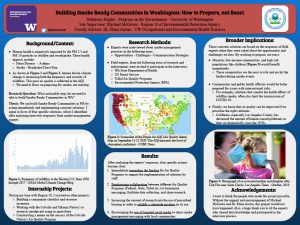Building Smoke Ready Communities in Washington: How to Prepare, Not React.
My motivation for my Capstone Project has been to learn about the impacts of wildfire smoke and woodsmoke on Washington State communities. In order to research how a community can prepare for smoke incidents, I interned with Region 10 of the EPA, built several community resources for their smoke management team, and conducted interviews of field experts. Over the course of my internship, I conducted seven different interviews with experts in smoke management, air quality research, forest management, public health, and tribal air quality programs. Using the responses from these interviews, I identified several critical opportunities and challenges which, I argue, will help communities to prepare, rather than react, to smoke. These opportunities include increasing funding for air quality programs, creating targeted social media messaging, consolidating a concrete position on the role of prescribed burning, and expanding collaboration between different air quality programs. Acting on these opportunities is critical because human driven climate change will continue to increase the frequency and severity of wildfires for the foreseeable future. Without immediate and decisive action, vulnerable communities in the State of Washington, who are already disproportionately impacted by smoke, will be exposed to even more of the negative health and lifestyle impacts.
